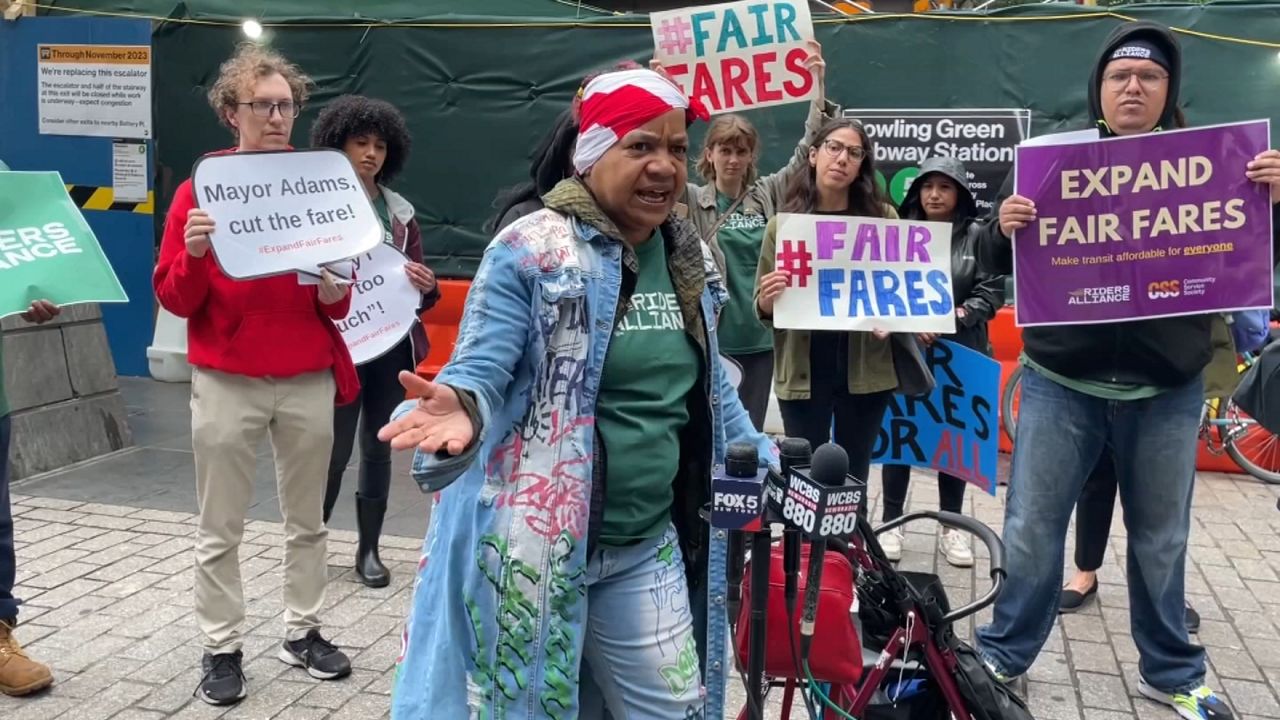Activists and public transportation users gathered in front of the MTA offices to protest against the proposed increase in subway and bus fares. The current fare of $2.75 would potentially rise to $2.90, a change that Mayra Aldaz believes would disproportionately affect those with lower incomes.
Aldaz, a member of the Riders Alliance, expressed concern that the fare increase would have a significant impact on immigrants and people of color. While the city has the Fair Fares program in place, it only benefits a small number of individuals living below the federal poverty line. To qualify for MTA discount cards, individuals must earn less than $14,580 per year or families of four must earn up to $30,000.
Aldaz called on the mayor to raise the minimum income requirement for the Fair Fares program to 200% of the federal poverty level. This change would extend the program’s reach to 1.7 million New Yorkers living in poverty.
Pedro Valdez Rivera, a public transportation user, shared his own struggles with the current fare system. He explained that his family’s combined income is slightly above the federal poverty level, making them ineligible for transportation card discounts. Rivera emphasized that the current income is not sufficient to cover basic needs, forcing him to choose between buying a bus ticket or having enough food for his family.
If approved, this 15-cent fare increase would be the first since 2015 and would take effect on September 4, 2023, which coincides with Labor Day. Aldaz argued that this increase would primarily impact the working class, particularly people of color and immigrants who rely on public transportation for their daily commutes. She urged the mayor to allocate more funding to the Fair Fares program and expand its coverage to support those who work multiple jobs and struggle to afford transportation expenses.
Ana María, a subway user, raised concerns about the accessibility of the subway system for individuals with disabilities. She questioned whether the fare increase would be accompanied by improvements to make the system more inclusive. María criticized the idea of raising ticket prices without addressing accessibility issues, deeming it absurd.
The activists and users of the city’s public transportation system are calling on the city and the mayor to reconsider the fare increase and prioritize the needs of low-income individuals and communities of color. They argue that public transportation should be affordable and accessible for all residents, regardless of their socioeconomic status.
What are the potential consequences of setting the threshold for earning less than $30,120 per year in an expensive city like this one?
Earn less than $30,120 per year, which Aldaz believes is an unrealistic threshold in one of the most expensive cities in the world.
She argued that the proposed fare increase would further exacerbate the financial burden on low-income communities, making it even more difficult for them to access essential services and opportunities. Many who rely on public transportation to commute to work, school, or medical appointments would be forced to make difficult choices between paying for transportation or other basic necessities.
In addition to the economic implications, Aldaz also highlighted the environmental impact of a potential fare hike. She pointed out that increasing fares may discourage people from using public transportation, leading to a rise in car usage and subsequently more traffic congestion and air pollution.
Activists at the protest called on the MTA to reconsider its proposal and find alternative solutions to generate revenue without burdening those who are already financially disadvantaged. They suggested exploring options such as increasing taxes on wealthy individuals or implementing a congestion pricing system to fund public transportation improvements.
Representatives from the MTA were not present at the protest, but activists vowed to continue advocating for affordable and equitable public transportation. They plan to engage in further dialogue with MTA officials and elected representatives to ensure that the voices of those most affected by fare increases are heard and considered in decision-making processes.

/cloudfront-eu-central-1.images.arcpublishing.com/madsack/6PPPCPOIW5HVLDWCADGXQSZYKM.jpeg)

It’s inspiring to see New Yorkers taking a stand against the potential fare increase. Accessible and affordable public transportation is crucial for the people of NYC. Let’s hope their voices are heard and a fair solution is reached. #KeepNYCTransitAccessible